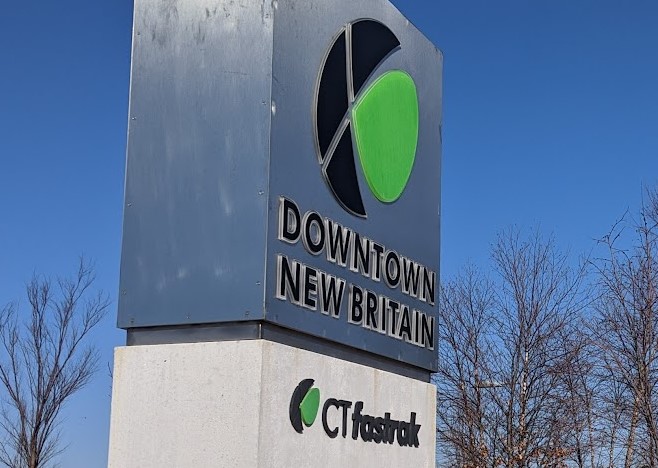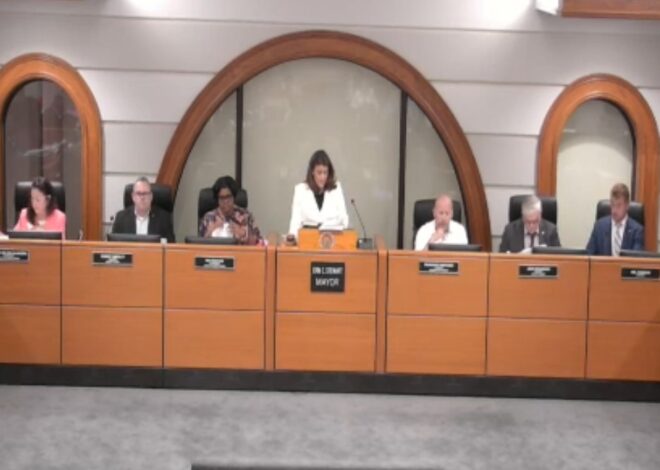Just two days before a key state decision regarding Republican Mayor Erin Stewart’s plan to allow strip-mining on New Britain’s protected drinking watershed land, Stewart has withdrawn the proposal.
Stewart’s withdrawal of the mining plan comes just before an August 24, 2018 special meeting of the state Water Planning Council (WPC). The WPC has previously been critical of the watershed mining plan. The meeting was called specifically for the WPC to make its final recommendations concerning the plan.

The meeting was held and the WPC approved recommendations, which were not not available as of the publication of this article. The August 24th date of the WPC meeting is the same date cited by Stewart in a letter that she sent to the Water Planning Council on July 10, 2018. In that letter, Stewart pointedly told the Water Planning Council that it, and another key state commission, the Council on Environmental Quality, are charged under law with providing the state legislature with a recommendation on the watershed mining plan, “within 60 days of the public hearing (August 24),” that the city held on the plan on June 26th.
Since the proposed mining would be on protected watershed land, it require a special exception or change in state law that only the state legislature would be able to authorize it.
Comments from the public were nearly all in opposition to the mining plan at the June 26th public hearing on the proposal, which was held in front of the City Council and the Board of Water Commissioners.
“I would like to thank the public for speaking out against this proposal,” said the City Council President, Ald. Eva Magnuszewski (D-AL). “Protecting our natural resources, especially water is of utmost importance.”
The mining proposal was to have involved removing a large section of a hill at an upstream part the watershed of New Britain’s primary drinking water reservoir, the Shuttle Meadow Reservoir. Stewart has been pressing forward with the watershed mining plan since at least February of 2016, spending approximately $350,000 of taxpayer funds to advance the proposal.
The Water Planning Council and the Council on Environmental Quality previously issued scathing criticisms of the report done for the Stewart administration by Lenard Engineering that supported the need for new “storage reservoir” which would, under the proposal, be created by the strip mining of the city’s watershed land. The Stewart administration has defended the plan to strip mine on New Britain’s drinking watershed land with the claim it would leave behind a new reservoir for the city.
Critics have claimed that plan is a dubious excuse for allowing the Tilcon company to mine the land.
The Water Planning Council’s previous report confirmed the critics’ concerns, saying that, “the WPC finds that the city’s report does not substantiate the need for the proposed new reservoir or, in fact, that the proposed reservoir would even be a viable public water storage facility. Based on this review, the WPC finds that the proposal’s risks to the current public water system and the environment are significant and the city’s report does not make a plausible case for undertaking such an activity and, therefore, does not justify the loss of forest and the ecological, recreational and environmental impacts.”
The WPC raised concerns about the quality of New Britain’s drinking water that may result from the mining, saying that, “Much of the area that would be impacted in the proposed expanded area of quarrying is located in the active public drinking water supply watershed of the Shuttle Meadow Reservoir. Surficial activities associated with the quarrying operation, including clear-cutting the forest and removing the stumps, soil and other natural material could create a significant water quality risk to the reservoir.”
“Bottom line,” said Magnuszewski, “there are alternatives to gas and oil but there is no alternative to water.”
“I hope the City is refunded the $354,000.00 that was spent on this study!,” added Magnuszewski. “Tilcon should have paid for the study, not the city!,”
Stewart’s apparent withdrawal of the watershed mining plan would be the second of her administration’s major watershed proposals that she has abandoned amid strong public opposition.
Stewart’s public push to allow Tilcon to strip-mine in New Britain’s protected drinking watershed land starting in 2016 at a similar time to when she also sought to sell the one million-plus gallon per day Patton Brook Well to the Town of Southington, whose support was important for winning approval of the watershed mining plan. Stewart’s plans to sell the Patton Brook Well began to unwind in October of 2016 when the New Britain Progressive (which was called the New Britain Independent at the time) broke the news that New Britain was in a drought-condition water supply alert.
Stewart admitted to the existence of the water supply alert one day after the New Britain Progressive broke the news about it. She proceeded to urge residents not to water their lawns and gardens in October for a water supply alert condition known to city officials during the entire summer of 2016.
Public opposition to the plan to sell the Patton Brook Well gained even more momentum in 2017 as severe drought conditions and the need to purchase water from the regional Metropolitan District Commission contradicted Stewart’s statements that the well was not needed by New Britain. By April, 2017, in the face of increasing pressure, Stewart gave up on the Patton Brook Well sale plans.
By the end of 2017, water was flowing from the Patton Brook Well into New Britain’s primary drinking water reservoir, directly contracting Stewart’s previous claim that bringing Patton Brook Well water to New Britain would be impractical and would take $1 million to do.
The City Council also recently defeated a proposal Stewart had made to sell to sell fifteen acres of New Britain owned Class 3 watershed land to the town of Burlington, apparently with Stewart having decided to withdraw her support for the plan. That proposal also had met with public opposition.
Editor’s note (8/24/2018): This article was updated to note that the WPC meeting did occur.
Editor’s note (8/28/2018): This article was edited for content and formatting.




